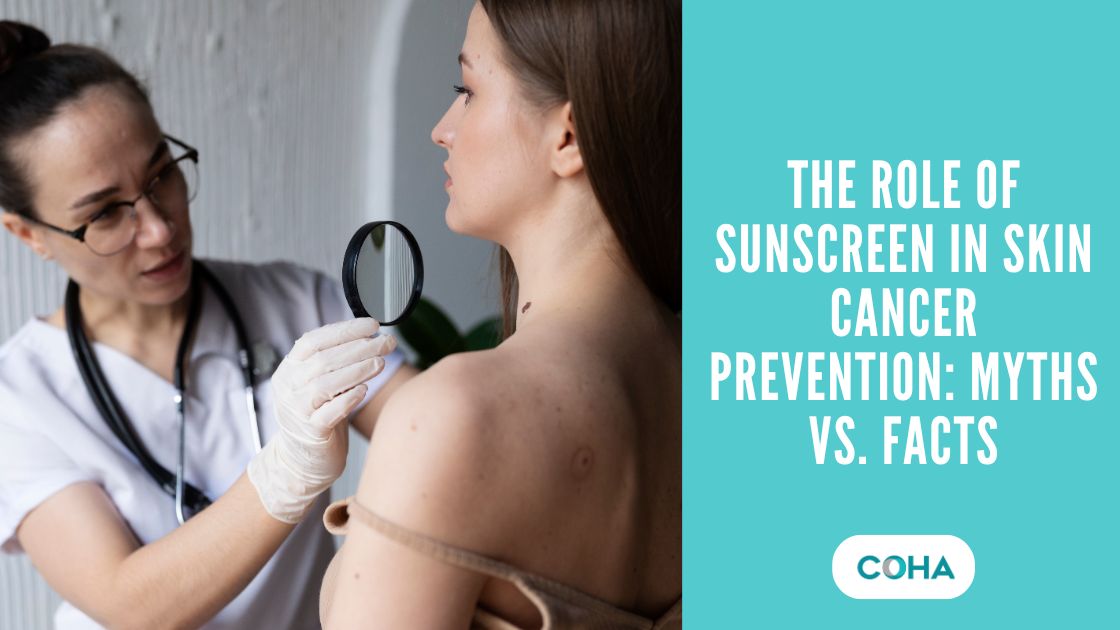


Skin cancer is a growing public health concern, with research indicating that one in five Americans will develop the disease by the age of 70. In 2024, researchers estimate that 200,340 new melanoma cases will be identified in the United States, with nearly 8,290 lives lost to this aggressive form of cancer. The increasing prevalence of skin cancer emphasizes the critical need for prevention strategies, particularly the use of sunscreen. However, despite its proven effectiveness, misconceptions about sunscreen and its role in skin cancer prevention persist. This blog aims to debunk these myths and share essential tips for effective skin cancer prevention.
Skin cancer occurs when skin cells begin to grow uncontrollably, often due to damage from ultraviolet (UV) radiation. The skin is the largest organ of the body and can be affected by various types of cancer, but skin cancer primarily manifests in three forms:
Skin cancer is more common than all other cancers combined. Early detection is crucial; when caught early, melanoma has a 99% survival rate. Key risk factors include UV exposure from sunlight or tanning beds and individual skin type, making awareness and preventive strategies essential.
Sunscreens are formulated to protect the skin from harmful UV rays. They are categorized based on their active ingredients:
The effectiveness of sunscreen is measured by its Sun Protection Factor (SPF). A broad-spectrum sunscreen with an SPF of 30 or higher is recommended for optimal protection against both UVA (which ages the skin) and UVB (which burns the skin) rays. It’s important to apply sunscreen generously and reapply every two hours or immediately after swimming or sweating.
Research consistently shows that regular use of sunscreen can reduce the risk of developing skin cancer significantly. A study published found that daily sunscreen use reduced melanoma risk by 50% compared to those who did not use it consistently. Furthermore, individuals who apply sunscreen daily have a significantly lower incidence of melanoma compared to those who do not use it regularly.Moreover, sunscreen not only protects against sunburn but also helps prevent premature aging and other forms of sun damage that could lead to skin cancer later in life.
Myth #1: Sunscreen is Only Necessary on Sunny Days
Fact: UV rays can penetrate clouds and still cause skin damage. Up to 80% of UV radiation can reach your skin on cloudy days, making it essential to wear sunscreen even when it’s overcast.
Myth #2: Darker Skin Does Not Need Sunscreen
Fact: While darker skin has more melanin, which offers some protection against UV rays, everyone is at risk for skin cancer. Studies show that people with darker skin tones are often diagnosed at later stages when treatment options are limited. Therefore, all individuals should use sunscreen regularly regardless of their natural complexion.
Myth #3: Tanning Beds are Safe if You Use Sunscreen
Fact: Tanning beds emit harmful UV radiation that significantly increases the risk of developing melanoma, regardless of sunscreen use. According to the World Health Organization (WHO), using tanning beds before age 18 increases melanoma risk by 75%.
Myth #4: Using Sunscreen Means You Can Stay in the Sun Longer
Fact: Sunscreen should complement other sun protection strategies such as seeking shade and wearing protective clothing. It does not allow for prolonged sun exposure without risk. Even with sunscreen applied, it's vital to limit time spent in direct sunlight during peak hours (10 AM to 4 PM).
To effectively prevent skin cancer, consider implementing these strategies:
Certain groups are at higher risk for melanoma and should be particularly vigilant about sun safety practices:
Incorporating sunscreen into your daily routine is a critical component of a holistic approach to preventing skin cancer. By educating yourself about skin cancer myths and facts, you empower yourself to make informed decisions regarding sun safety. Regular dermatological check-ups and responsible sun exposure practices are vital steps in safeguarding your health against this preventable disease. Contact us today at Chesapeake Oncology-Hematology Associates for more information on skin cancer prevention and treatment options. We are also dedicated to patient education and care.
Remember that taking proactive measures today can lead to healthier outcomes tomorrow.